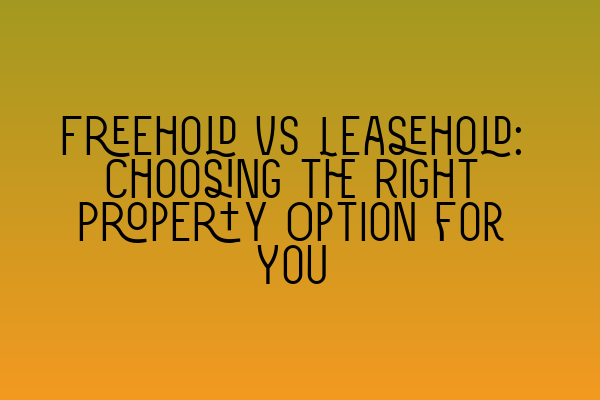Freehold vs Leasehold: Choosing the Right Property Option for You
When it comes to buying a property, one of the most important decisions you’ll face is whether to opt for a freehold or leasehold property. Both options have their advantages and disadvantages, and choosing the right one for you can greatly impact your ownership and rights over the property. In this blog post, we will discuss the differences between freehold and leasehold properties, and provide guidance to help you make an informed decision.
Freehold Properties: Full Ownership and Control
Let’s start by understanding what a freehold property entails. A freehold property refers to owning both the land and the building outright, with no time limit on the ownership. This means you have complete control over the property, and there are no additional fees or obligations towards a landlord or management company.
The advantages of purchasing a freehold property are numerous. Firstly, you have the freedom to make any changes to your property without seeking permission from anyone. This includes renovating, extending, or altering the property as per your preferences. Additionally, freehold properties often appreciate in value over time, providing a long-term investment opportunity.
However, it’s important to consider the potential downsides of freehold ownership as well. Since you will have full responsibility for the property, this includes maintenance and repairs, which can be costly. It’s essential to factor in these additional expenses when budgeting for a freehold property.
Leasehold Properties: Ownership with Limitations
On the other hand, leasehold properties grant you ownership of the property for a fixed period, typically between 99 to 999 years. While you’ll have exclusive rights to the property during the lease term, you’ll still have certain limitations and obligations towards the freeholder or landlord.
One advantage of leasehold properties is that the maintenance and repair responsibilities often fall under the responsibility of the landlord or management company. This can help alleviate the financial burden, particularly for major repairs or structural issues. Additionally, leasehold properties are more common in apartment buildings or developments, offering shared amenities and communal areas, such as gardens or gyms.
However, it’s worth noting that leasehold properties come with additional costs. Ground rent, service charges, and administration fees are typically part of the leasehold agreement. These ongoing expenses can vary greatly depending on the property and its location. It’s crucial to thoroughly read and understand the terms of the leasehold agreement before committing to a purchase.
Choosing the Right Option for You
Now that we’ve covered the basics of freehold and leasehold properties, how do you determine which option is right for you? Here are a few factors to consider:
1. Future Plans: If you’re looking for a long-term investment or a property to pass down to future generations, a freehold property may be the better choice. Freehold ownership offers more flexibility and control over the property.
2. Budget: Leasehold properties often come with additional costs, such as ground rent and service charges. It’s important to factor in these expenses when calculating your budget and determining what you can afford.
3. Lifestyle: Consider your lifestyle and preferences. If you prefer a hassle-free approach to property ownership, where maintenance and repairs are taken care of by others, a leasehold property with shared amenities may be more suitable.
4. Local Market: Research the local property market and understand the prevalence of freehold and leasehold properties in your desired location. This can help you make an informed decision based on market trends and potential resale value.
5. Professional Advice: Seeking legal advice from a solicitor specializing in property law is highly recommended before making a decision. They can review the leasehold agreement or any freehold restrictions and provide guidance tailored to your circumstances.
In conclusion, choosing between a freehold and leasehold property requires careful consideration of the advantages, disadvantages, and your personal circumstances. Understanding the implications of each option and seeking professional advice can help ensure you make an informed decision.
For more information on property law, please feel free to check out our related articles:
– Understanding Contractual Capacity: Rights and Limitations
– Interactive SQE Mock Tests for Contract Law: Test Your Knowledge
– Join Our SQE Contract Law Webinars: Expert Insights and Guidance
– Contract Law Reforms: An Analysis of Recent Changes
– Parties in a Contract: Rights and Responsibilities
At SQE Property Law & Land Law, we specialize in guiding clients through the intricacies of property ownership and related legal matters. Contact us today to learn more about our services and how we can assist you with your property journey.
